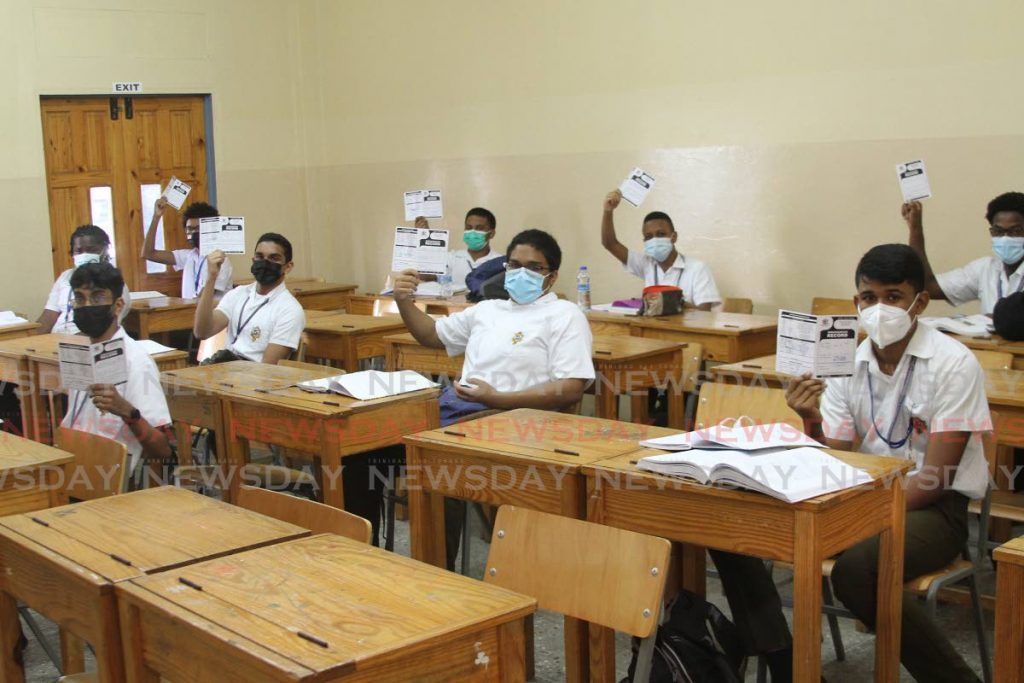Gadsby-Dolly tells development bank conference: Schools manage face-to-face, virtual classes

Trinidad and Tobago is handling the education of students with a mix of face-to-face and online classes, Education Minister Nyan Gadsby-Dolly told the Development Bank of Latin America (CAF) annual conference on Tuesday.
Gadsby-Dolly was one of the speakers at the forum – The lost year – that focused on the effects of the covid19 pandemic on the educational system in Latin America and the Caribbean.
“We have a hybrid system and we have asked the schools to submit to our blueprints and one of them is the number of students to go back to school,” said Gadsby-Dolly.
The minister said all schools have been asked to do diagnostic tests of their students so teachers can determine how well they are doing.
She added: “We are closely watching the performance of our students. As for the teachers, we are evaluating the training with online methods. Teachers are now adept at managing services with the existing environment. They also have the necessary emotional and technical support for (students) return to the classroom,” said Gadsby-Dolly.
TT's policy has been for vaccinated children 12 to 18 to attend classes at schools which resumed in early October. On Wednesday, Gadsby-Dolly announced vaccinated and unvaccinated students in forms four to six will be allowed to attend classes together following public health protocols from Monday. However, a similar
Claudia Uribe, director of the Unesco Regional Bureau for Education in Latin America and the Caribbean, highlighted concerns about the negative impact of the pandemic.
“Latin America and the Caribbean are facing a bleak outlook due to deficiencies and inequalities. The closure of educational institutions has tested the resilience of our region with more than 170 million children without school classes and today about 80 million are still in that situation."
Unesco estimates three million children and adolescents will no longer return to school after the pandemic. In addition, 6.7 million children will not reach the goal.
"To the extent that health advances and vaccination allow, we will advance in the return to educational normality," she said.
Although, she said, the reopening of schools does not guarantee the presence of all students as many parents will keep their children at home.
Mariano Jabonero, secretary general of the Organization of Ibero-American States (OEI), highlighted the efforts made by the education ministries of each country to maintain school activities through the digital system.
However, he said it is necessary to invest in the face-to-face return to classes because that is where the best education is provided. "We must evaluate the effects of the pandemic and invest in education, they are the main messages to reduce the gap that has been opened and overcome the potholes of the past."
María Victoria Angulo González, Colombia's education minister, said a decline in investment in education must be avoided. "It is a time of immense challenges, but of change," she said.
She explained in Colombia students returned to classes in two stages since July with 40 per cent and currently 71 per cent.
“The vaccination process has been very important for the return. We are also developing several projects to strengthen capacities at the service of learning, we set up a network of tutorials at the university level for the learning process in primary education," she said.
María Brown Pérez, Ecuador's education minister, highlighted how the conference serves to examine the measures that countries have taken to resume in-person classes and to make up for lost time.
She said in Ecuador 100 per cent of the students and teachers complied with the vaccination programme, which makes it much easier to return to the classroom.
She said parents have been fundamental in strengthening the education of their children and the families work with educators.
Leandro Folgar, president of Plan Ceibal, highlighted the bond between teachers and parents that has been strengthened as a result of the pandemic and virtual classes.
The 25th edition of CAF's annual conference was held over two days, ending Wednesday, to discuss the main challenges facing the region.
Organised since 1997 together with the Inter-American Dialogue and the Organization of American States, CAF's conference is one of the main hemispheric meetings that allow the debate and analysis of major political, economic, and social trends in Latin America and the Caribbean.


Comments
"Gadsby-Dolly tells development bank conference: Schools manage face-to-face, virtual classes"